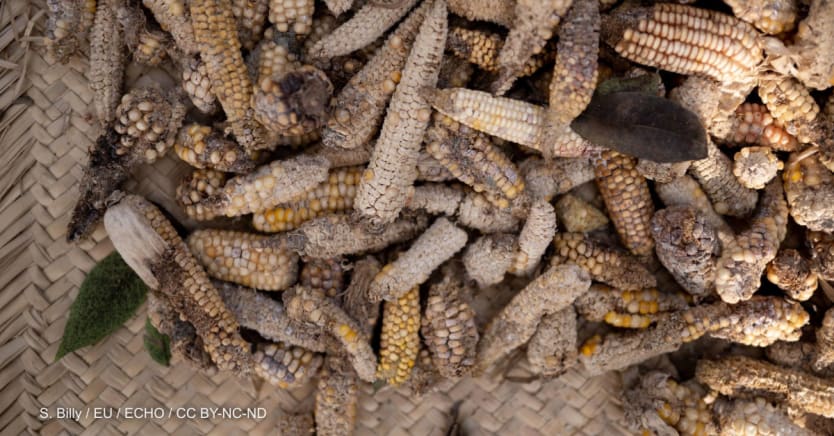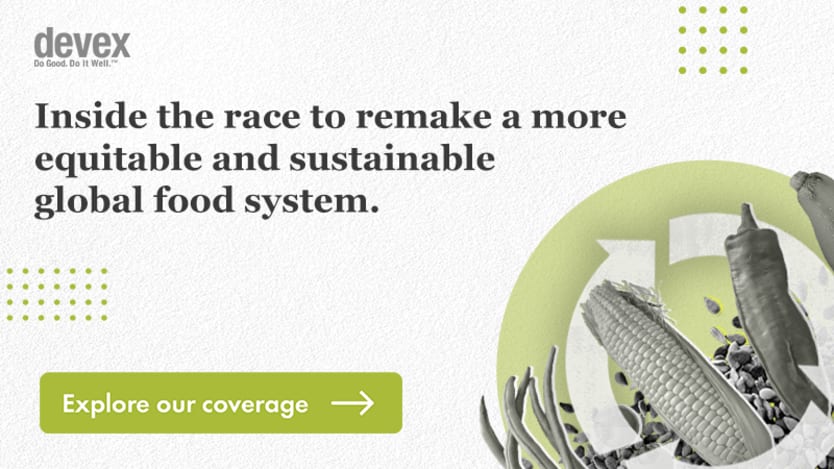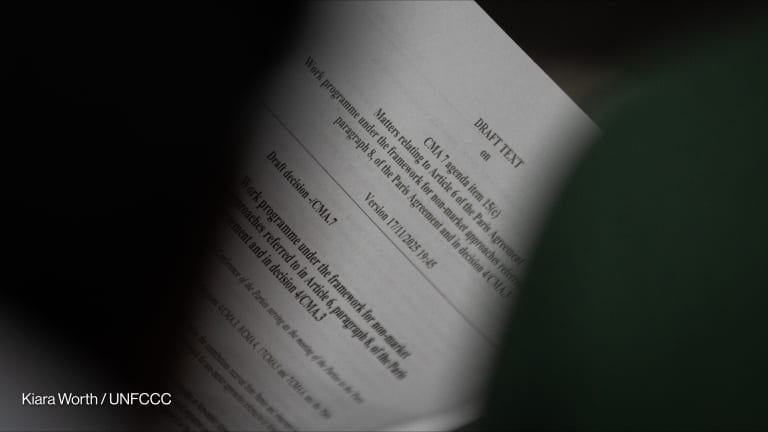
Themes such as finance, gender, and youth and public empowerment dominate the daily agendas at the 26th United Nations Climate Change Conference of the Parties, or COP 26, which is hosted by the United Kingdom and kicked off Monday. But not one day during the two-week event puts food systems at the center of discussions.
All you need to know from COP 26
To get on-the-ground coverage, in-depth analysis, and behind-the-scenes reporting from COP 26, sign up for our special edition newsletters.
As world leaders and thousands of civil society members descend on Glasgow, Scotland, to negotiate the fate of the planet, leaving the topic of food systems out of climate negotiations puts both agendas in danger, Ruth Richardson, president at the Global Alliance for the Future of Food, told Devex.
“Food systems are largely absent from the climate conversations. I think there has been some headway in bringing in agriculture, but certainly not food systems in their entirety,” Richardson said.
“And we know that when we look at food systems as a whole — when we’re talking about chopping down the rainforest for livestock production, we’re talking about transporting beef across the country and long supply chains, and we’re looking at all the various aspects of food systems — we know that they are the No. 1 contributor to greenhouse gas emissions,” she added. “So unless we deal with food systems, we’re not dealing with climate.”
She said that although COP includes a day focused on nature — described on the agenda as “Ensuring the importance of nature and sustainable land use are part of global action on climate change and a clean, green recovery” — that isn’t the same as food and food systems.
“We’ve really put a push on the need for connecting up all these agendas: the climate, nature, food, and I would even go further and say health and equity,” Richardson said. “These are all so intimately connected, and we cannot really separate them out.”
The food system accounts for as much as 37% of greenhouse gas emissions, making it all but impossible to achieve global targets if agriculture is not included in conversations on decarbonization. But as Richardson pointed out, research by the Global Alliance for the Future of Food is suggesting that few countries are including food systems in considerations of their so-called nationally determined contributions — the climate efforts that individual nations say they will take to reduce emissions under the Paris Agreement.
The research, which is assessing NDCs in 14 countries, has found that Germany moved away from harmful agricultural subsidies in its plan, while Colombia’s and Kenya’s plans include a focus on agroecology, or the principle of balancing sustainable farming with nature.
According to the World Wide Fund For Nature, 20% of the emissions reductions needed by 2030 could be delivered by climate action in the food system. Many countries mention the climate impacts of agriculture, but “very few outline concrete plans and specific targets,” WWF said.
Enock Chikava, interim director of agricultural development at the Bill & Melinda Gates Foundation, said world leaders meeting in Glasgow must consider how vital agriculture is to people’s livelihoods globally. The changing climate, including increasing temperatures and varying rainfall patterns, affects the success of farmers — which, in turn, impacts livelihoods and economic opportunities across the planet.
But many wealthier nations are disconnected from this reality, according to Chikava.
“We need to really have this message go far and wide about the urgency of us taking action today,” he said. “I don’t think high-income countries really understand this. … In sub-Saharan Africa, 50% of all your employment comes from ag, and agriculture produces 30% of the [gross domestic product].”
Richardson said she expects lower-income countries to increasingly demand that the developed world do its part in reducing emissions, including those produced by the food system. The African Union has been more vocal, Chikava said, due to the proportion of people relying on agriculture in member states. For example, that figure is as high as 92% in Burundi and about three-quarters of the population in Niger.
“We want them [higher-income nations] to deeply understand [that] agriculture, for most people, is really a way of life. For someone who grew up on the farm, I know this personally. The debate in most of these global forums — if you don’t have all this info in front of them — it will really be an issue of ‘agriculture is affecting climate change,’” Chikava said. “But the real alarm should be ‘climate change is affecting agriculture.’ I’m really trying here to have the narrative change. … And if you have that narrative, then you say, ‘I can do something about it.’”
The increasing influence of climate change on agriculture is contributing to global hunger levels, which are on the rise after years of decline. Projections show the world is not on track to meet Sustainable Development Goal 2 — ending hunger — by 2030, as farmers around the world deal with droughts and pests that are disrupting harvests and access to nutritious, affordable diets.
“Unless we deal with food systems, we’re not dealing with climate.”
— Ruth Richardson, president, Global Alliance for the Future of FoodSaleemul Huq, director at the International Centre for Climate Change and Development, said he doesn’t have high hopes for the outcome of official negotiations at COP 26. Real action will come not from world leaders, but from those in civil society who have gathered in Glasgow to form connections and partnerships, he said.
“Getting language into the negotiating text is a fool’s errand because even if they agree to something in the text, they don’t do it. Getting it in the text is less important than getting the right people coming together to do something about it — and that’s really the opportunity in Glasgow,” said Huq, who also recently led the U.N. Food Systems Summit “action track” on building resilience to shocks, vulnerabilities, and stress.
“In my view, the way to do that is to get the outcomes of the [Food Systems Summit translated] … into actions by the relevant actors, which could be governments, it could be coalitions of the willing, it could be U.N. agencies, it could be philanthropies — whoever is interested,” he added. “The alliances that we’ve created are the ways to go.”
The Food Systems Summit took place in September, with the aim of bringing together different sectors and creating lasting connections. To continue the momentum of the summit, organizations that helped lead its action tracks are set to co-host an event next week.
“I call these people [from civil society at COP 26] not ‘the sidelines,’” Huq said. “I call these people the COP; I call it the ‘conference of people,’ and that’s us. And the conference of negotiators is what happens inside the blue zone [designated for world leaders and other official participants], and it’s totally unintelligible and will come out with very little at the very end.”
He added: “The rest of us who are in Scotland — there are thousands of us here — [are] the people who are doing things. And if we can get together and do things and plan things together and make actions together, that actually has real impacts.”









